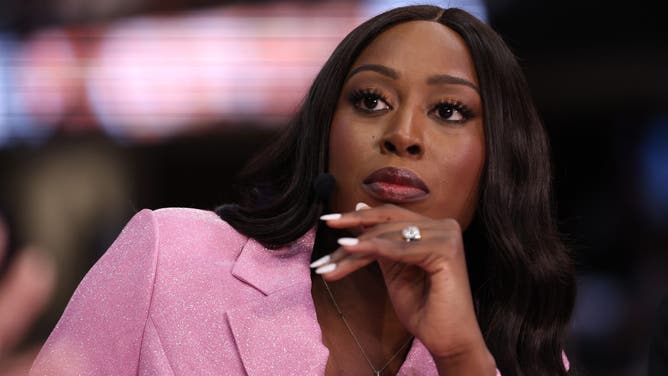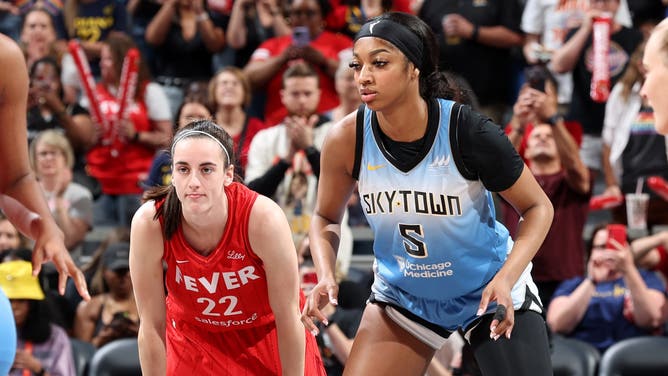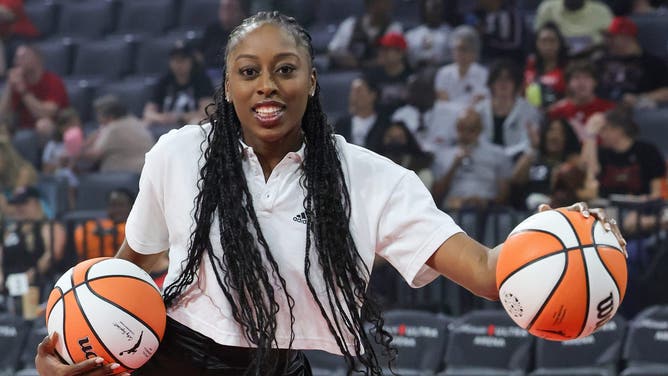ESPN's Chiney Ogwuwike Only Wants People Talking About Women's Sports The Right Way
The popularity of women's basketball has exploded thanks to interest in Caitlin Clark. People are talking about women's sports more now than perhaps ever before. But that's caused some in the media, like ESPN's Chiney Ogwumike, to complain about the way people talk about women's sports.
She's not the first to complain about it, and she won't be the last. And, quite frankly, I'm getting tired of media elites telling people how they need to talk about and consume products.
"This is the moment that we've been waiting for in women's basketball. And honestly, it's way bigger than that. This is the moment that we've been waiting for in women's sports, but we cannot fumble it," Ogwumike said, in a video post on X (formerly Twitter).
"We are all witnessing this unprecedented moment of change. And not just like you're a regular, schmegular change. That transformational change that can close the gap of equity, of opportunity, of how we see one another through the lens of sports," she continued.
Jeez. Talk about being grandiose. I mean, clearly, an ESPN commentator couldn't give a long-winded speech without mentioning the word "equity." That's one of three key tenets in Diversity, Equity and Inclusion (DEI).

ESPN commentator Chiney Ogwumike doesn't like the way people are talking about women's sports right now.
(Steph Chambers/Getty Images)
"But here's the problem," Ogwumike said. "Women's sports are right now being subjected to some of the most polarizing aspects of society. The discourse is operating at the intersection of race, of gender. It's even being weaponized by politics. The endless debates are overshadowing the beauty of the game."
This is a tiring talking point. Maybe people aren't talking about "the beauty of the game" because they aren't that interested in the actual basketball. The main reason women's basketball has struggled to gain popularity is that it's just not as compelling as men's basketball.
That's not really a knock; the reason OutKick advocates against men competing in women's sports is because men are bigger, faster and stronger, on average, than women. That makes them better athletes. This isn't an opinion, it's a fact.
People, generally, want to watch the best-of-the-best compete. Any WNBA team would struggle to beat a high-level boys' high school basketball team.
The fact that people are talking about women's basketball is because of what's going on around the game. It's captured the country because there are aspects of race that draw people in.
Caitlin Clark is a unicorn who is very relatable. She's not overly big or imposing, which makes little girls think they can be like her.

Part of Caitlin Clark's appeal is her relatable to the average American, partly because of her lack of natural size compared to players like Angel Reese.
(Jeff Haynes/NBAE via Getty Images)
Angel Reese is 6'3". Most girls aren't going to grow to that size. She's not nearly as relatable to the average American girl, and it's not because of her skin color.
It's the same way that kids were captivated by Steph Curry.
They all know they can't grow to the size of LeBron James, but Curry looks more like an average American and gave kids something to aspire to be with hard work and dedication to a particular skill. That skill, for Curry and Clark, is being able to shoot a basketball from long-distance.
To her credit, Ogwumike at least acknowledges that people talking about women's basketball and women's sports is a good thing. Still, she wants the conversation to be on her terms.
"Don't get me wrong, we want conversation, but we want it to be constructive," she said. "Which is why I hope that everyone sees that the dialog surrounding women's sports has to change. Why? Because words influence perception."
She then says that the increase in attention is important, but again, only if pointed in the correct direction – the correct direction, of course, is how Ogwumike sees it.
"But imagine if we were able to make that increase in coverage truly count. Now how do we do that? By not only creating spaces for the right voices, but by also being willing to listen to what those voices have to say," she said.

ESPN commentator Chiney Ogwumike doesn't like the way people are talking about women's sports right now.
(Ethan Miller/Getty Images)
Honestly, Ogwumike is much more respectful in this video than some others who have shared similar sentiments, though in a much more aggressive fashion. This isn't an attack on her, per se, but more about people in her position and their clear message to fans: "shut up and watch."
That sounds an awful lot like "shut up and dribble," a phrase that I am certain Ogwumike hates and finds incredibly disrespectful. But that's what she's saying.
She wants us to create "spaces for the right voices." What the hell is the "right voice"? Hers? Only people who have played in the WNBA? If that's the case, it's sure going to limit the number of people who can contribute to the conversation. But isn't that what she wants? It's exactly what she wants.
"I respect the excitement, the passion for the moment that we're in right now," she continued. "But I do think we need a moment of reset, a moment to catch our breath and listen. Truly listen.
"Because the growth of women's sports, the growth of the women's game is happening… We're all in the same place, and you have the power to move the needle, but it's your choice whether or not you choose to move it in the right direction."
"The right direction." Again, according to whom? Why are there suddenly all these gatekeepers who decide exactly how people need to discuss these events? Women's basketball is interesting, largely because of things that are happening off-the-court. She's saying keep the conversation to "on-the-court."
But guess what? That was the conversation for 27 years and no one watched as the WNBA lost money year-after-year. Now that the sport is finally getting attention, and on the way to making money, some people are trying to dictate the terms of how that money is made.
That's not how it works. You can't have your cake and eat it, too. Enjoy the added attention and the money that is sure to come with it.
But if these commentators and players keep trying to push people away – a particular group of people that they just don't like – they're going to push away the attention and the money, too.